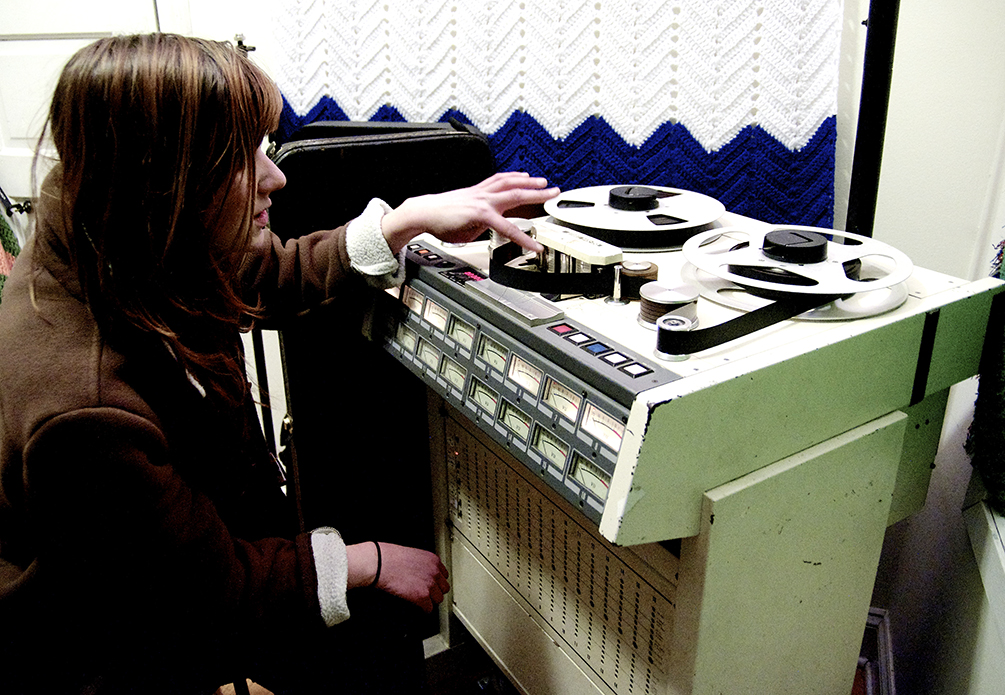
“I remember when I was in second grade I had this vision of me being a businesswoman—I’m going to grow up and be an adult and wear a pantsuit and carry a briefcase,” says Little Village-based musician Haley Fohr. “I didn’t realize there were other ways to do it.”
Four albums later, the twenty-four-year-old singer and guitarist behind Circuit Des Yeux has proved that yes, there is another way of doing it. On October 29 she released “Overdue” (four weeks late, appropriately enough), her latest and most polished effort, as well as her first recorded work since graduating from Indiana University and moving to Chicago.
Circuit Des Yeux’s music reflects Fohr’s determination to live on her own terms—her songs are haunting, difficult, and extremely personal. “Overdue” is no different. Fohr even built her own temporary studio from scratch to have complete control over its recording. A cohesive collection of jangly twelve-string guitar riffs, multilayered electronic feedback, and synthetic string orchestras, the record places Fohr’s captivating vocals front and center. Her voice moves from deep and melancholy on songs like “Lithonia” and “My Name Is Rune” to a frightening chant on “Acarina” before slipping into Patti Smith-like intensity with growls of “I want out! I want out! I want out!” on “I Am.”
The songs were all written within months of Fohr’s arrival in Chicago, and this transition played a formative role in shaping their content.
“Moving to Chicago was a struggle and I think post-college [life] in America is kind of a daunting thing, especially with the economy the way it is,” Haley says over cups of stovetop espresso. “When you move someplace new and every habit that you have and ritual you have is thrown out the window, it’s a scary place to be. I felt like I was kind of floating in thin air, and I didn’t have anyone to call and no one to check up on me. It’s liberating but it’s also kind of scary.”
Fohr now shares her old two-story wooden house in Little Village with three other roommates. The space is filled out with a gas furnace, a backyard sauna, and a small office for selling records and merchandise. Fohr insists that after a year in Chicago she’s now taken root and is comfortable with her situation. When she first wrote the songs on “Overdue,” however, she was still moving between small, dirt-cheap apartments in Pilsen and Little Village, with few social contacts and two jobs in addition to her musical endeavors.
Like many young artists, some of whom were quickly moving to the same neighborhoods as she was, her creative ambitions were put to the test.
“The record’s a lot about escapism, but it’s also about confronting reality,” Fohr says. “I realize I can’t create my own reality, that we’re all living in the same world, but I can offer maybe a different lens on reality, and a lot of the things I’m going through everyone is going through or a lot of people have.”
Her goal, she says, is to express these lightbulbs of memories in her songs in a way that her audience can catch on to. While her approach to this in her music has always been insular and lonely, on her newest record her perspective was also strongly influenced by the immense diversity and culture she found surrounding her on the South Side.
“The little things that people do in everyday life really were just eye-opening to me. Just watching people, how hard it is to get by for some, me included, and a lot of people have it worse than I do. But it’s like paying the bills and getting groceries and trying to raise a family,” Fohr says. “[The record] was extremely influenced by the South Side. That’s where it was recorded, that’s where I had these ideas floating through my head.”
Coming from the green bubble of Bloomington, Indiana, where the environment can be stifling but “it’s almost too easy to live,” the transition to Chicago was a shock. It was also another opportunity for Fohr to do things her own way.
After finally finding her place in Little Village, Fohr explored newfound freedom during the recording process for “Overdue.” Last February, with little equipment or support from a record label, nor much interest in anything but a lo-fi sound, she built a studio from scratch with Cooper Crain of the bands Cave and Bitchin Bajas. Though the space was dismantled in May after the record was completed, she recounts the legend of the construction of U.S.A. Studios with pride.
“[Crain] was the owner of this studio selling their tape machine and it’s 1,200 bucks, and I was like, I can’t freaking afford [spending] 1,200 bucks.” Using the insurance check she received after her gear was stolen from her car, however, they managed to split the cost. Then she bought a mic preamp with a sixty-day refund policy, instantly giving them a deadline for laying down the album’s basic tracks, which they would meet with only hours to spare. A friend volunteered to rent his apartment for cheap as a studio space, and after sound treating with old clothes, a quilt, and even a few avocado shells, U.S.A. Studios was born.
“It was kind of a sacred space, because we built it with our own hands,” Fohr says. “I do want to do music as my career, and I want to do it on my own terms. I just never realized how difficult it is, because there are people who have an idea of how to do things and they’re going to put their fingerprints on it as well. This may sound narcissistic or even maniacal or something but I just can’t. I gotta do it for me.”
